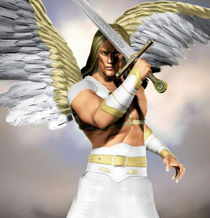The Catholic Defender: Blessed Emmanuel Ruiz and Companions
- Donald Hartley

- Jul 7
- 3 min read
Deepertruth with special permission and aid with Franiciscan Media, a great team for the Lord

From the days of St Stephen all the way down the centuries the Church has had her martyrs, but the nineteenth century is distinguished for the great number, enthusiasm, and heroism of its martyrs for the Faith.
The Orient has supplied most of these. China heads the list, but there are also martyrs from Japan, Korea, Cochin-China, Syria, France, Spain, and Peru. The accounts of their martyrdom tempt us to believe that we are reading of a past far removed from our own age; but the fact is that many of them have lived in our own lifetime.
Not much is known of the early life of Emmanuel Ruiz, but details of his heroic death in defense of the faith have come down to us.
Such modern martyrs are those of Damascus during the frightful massacre by the Cruses in 1860. A quarrel between a Maronite and a Druse was the occasion for the opening attack. The Druses were armed, but the Christians allowed themselves to be disarmed by the Turkish authorities under the pretense of preserving order.
Within three weeks every Maronites village of the main and southern parts of Lebanon was pillaged or burned, six thousand Maronites were murdered, maimed, or outraged. The massacre broke out in Damascus on July ninth, and in three days the adult males alone numbered three thousand victims.
Among these were eight Friars Minor, who, by the circumstances of their death, are shown to have been martyrs for the Faith. Blessed Emmanuel Ruiz and Companions. Six were priests, the other two were lay brothers. Emmanuel Ruiz was the superior of the convent, Carmen Volta (Botta) was the procurator, and Engelbert Kolland, the assistant Procurator. Nicanor Miano, Nicholas Mary Alberca, and Peter Soler were studying the Arabian language in preparation for their apostolic labors. The lay brothers were Francis Pinazzo and John James Fernandez.

When the rabble attacked the Christians, these religious and their flocks recommended themselves to God and to Our Blessed Lady, and then prepared themselves for death by devoutly receiving the sacraments. At midnight the soldiers entered the convent and, in many ways, tried the faith of the friars. Promises and threats proved futile, and the tortures to which the Mohammedans resorted to shake the faith of these holy men were hair-raising.
Born of humble parents in Santander, Spain, he became a Franciscan priest and served as a missionary in Damascus. This was at a time when anti-Christian riots shook Syria, and thousands lost their lives in just a short time.
Among these were Emmanuel, superior of the Franciscan convent, seven other friars, and three laymen. When a menacing crowd came looking for the men, they refused to renounce their faith and become Muslims. The men were subjected to horrible tortures before their martyrdom.
Father Emmanuel Ruiz, realizing that death was inevitable, and fearing lest the Sacred Host in the tabernacle be subjected to profanation by the fanatics after their death, went to the church to consume the Sacred Species. It was not long before he was interrupted, and so, recommending himself to God, he placed his head upon the altar to be cut off with a sword.

Father Carmen Volta was beaten to death with a cudgel; Father Peter Soler’s life was cut short with the sword; Father Nicholas Alberca was shot down; Father Engelbert Kolland was killed with an ax. Father Nicanor was also quickly dispatched, and the two lay brothers likewise manifested great strength of soul. With their eyes and hands raised to heaven in suppliant prayer, they were hurled from the tower of the church whither they had taken refuge.
Emmanuel, his brother Franciscans and the three Maronite laymen were beatified by Pope Pius XI in 1926.
The Holy See acknowledged the heroism of Blessed Emmanuel Ruiz and Companions when Pope Pius XI enrolled them, as also three Maronite laymen, among the martyrs and conferred on them the title of Blessed in 1926, the seventh centenary year of the death of St Francis.
The Church in Syria has known persecution throughout its history. Yet it has produced saints whose blood was shed for the faith. Let us pray for the Church in Syria.





















Comments